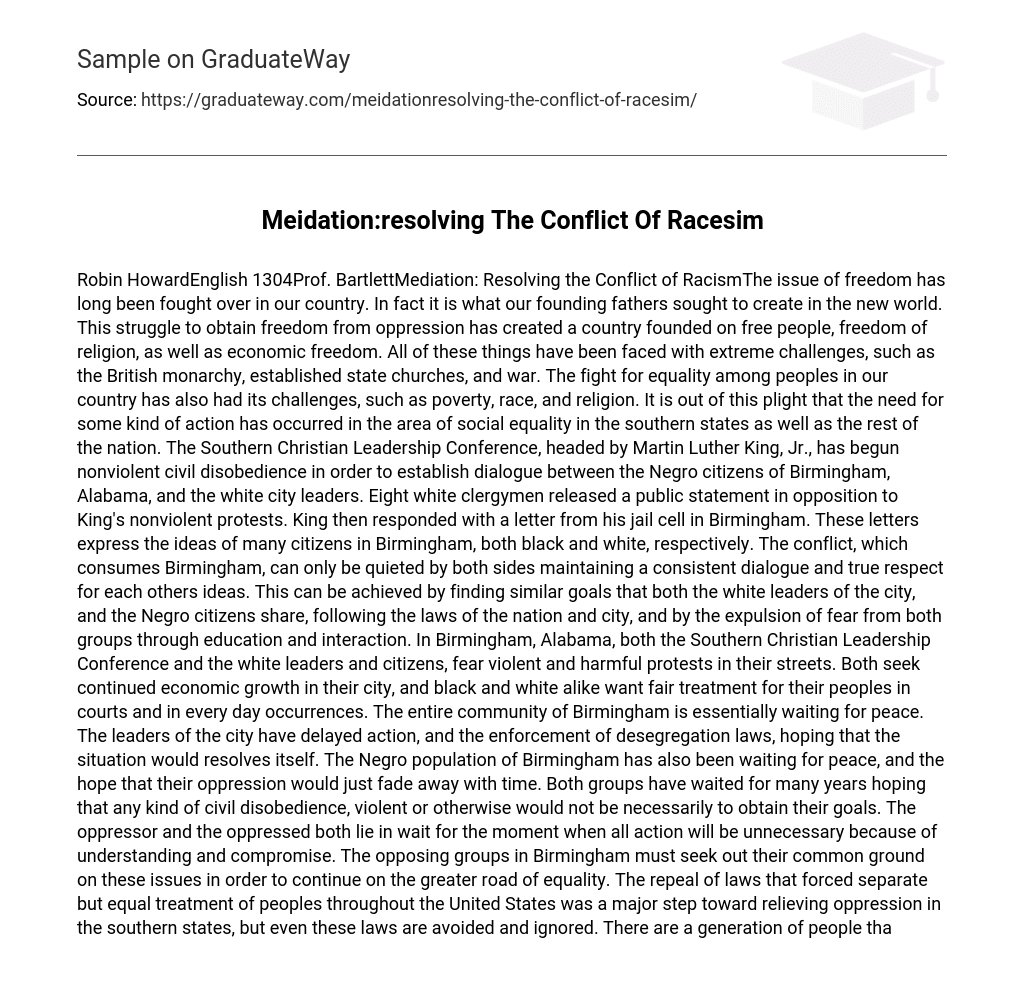The topic of freedom has always been a challenge in our country. The objective that our ancestors pursued when they founded the new world was precisely this. This battle against oppression led us to become a nation where individuals have the liberty to practice any religion, experience economic freedom, and are liberated from British monarchy, government-endorsed churches, and warfare.
The issue of equal treatment in the United States has encountered difficulties concerning poverty, race, and religion. As a result, achieving social equality has become an urgent concern nationwide, including in southern states. To tackle this matter, Martin Luther King Jr., leader of the Southern Christian Leadership Conference, employed nonviolent civil disobedience to initiate dialogue between African American residents of Birmingham, Alabama and white municipal authorities. In reaction to this approach, eight white clergymen released a public statement expressing their opposition to King’s peaceful protests.
King responded to the conflict in Birmingham with a letter written from his jail cell. In this letter, he expressed the thoughts of numerous citizens in Birmingham, regardless of their race. The key to resolving the intense conflict in the city lies in fostering ongoing communication between both sides, while genuinely respecting each other’s ideas. This can be accomplished by identifying common objectives that both white leaders and African American citizens share, adhering to national and local laws, and promoting education and interaction to eliminate fear within both groups.
In Birmingham, Alabama, there is a shared concern among the Southern Christian Leadership Conference, white leaders, and citizens about potential violent protests occurring in their streets. These groups all desire continued economic growth for the city, as well as fair treatment in the courts and in daily life for both the black and white communities. The entire community of Birmingham is eagerly anticipating peace. City leaders have been delaying action and the enforcement of desegregation laws, hoping that the situation would resolve itself. The black population in Birmingham has also been patiently waiting for peace and hoping that their oppression would fade away over time. Both groups have been waiting for many years in the hope that achieving their goals would not require resorting to civil disobedience, whether violent or peaceful.
Both the oppressor and the oppressed eagerly anticipate a time when their actions will become redundant due to mutual comprehension and reconciliation. In Birmingham, the conflicting factions must actively search for shared perspectives on these matters to further progress towards equality. The abolishment of legislation enforcing segregated yet comparable treatment for various groups across the nation was a crucial advancement in alleviating oppression in southern states. However, even these laws are being evaded and disregarded.
The people of Birmingham have experienced segregation, which has created a sense of superiority for one group and inferiority for the other. This divide between the people has significantly widened over time. As a result, they now perceive their lives as permanently segregated, constantly reminded of their differences rather than focusing on shared commonalities. To promote harmonious relations in Birmingham, it is crucial for all citizens to obey the city’s laws and uphold any commitments made to the opposing side.
The clergymen who authored the letter opposing nonviolent action acknowledge the unstable state of affairs in Birmingham. However, they contend that the African American community should exercise patience and allow time to rectify their problems. As a result of this perspective, important gatherings between influential figures from both sides have been delayed or canceled by city leaders. Although this response is understandable, it remains unacceptable since the issues to be discussed in these meetings are integral to freedom and have been neglected in our nation for a long time. Even our constitution has overlooked the subjects of race, slavery, and oppression.
The document did not mention the word “slave” at all. The Birmingham leaders are following a long-established tradition of avoidance that our nation’s founders started. Meanwhile, the African American population has been fighting against oppression and waiting for over three centuries for significant societal change. It would be unfair and unjust to ask this community to wait any longer.
Immediate actions are necessary to maintain peace in Birmingham. It is essential to remove signs from windows and ensure that neither group engages in violence. City leaders should focus on creating long-lasting and beneficial laws for the citizens, rather than implementing temporary solutions that will likely be disregarded. Such efforts would foster goodwill between groups and help ease tension in Birmingham.
Enforcing desegregation is crucial for improving the social climate in Birmingham. It is essential to create a new generation of children who can perceive life without segregation. Conflict in Birmingham will persist until both the white and Negro communities embrace their similarities and merge. The people of the city must be open-minded and committed to a desegregated community; otherwise, violence will inevitably erupt in Alabama’s streets. Positive interaction between individuals is necessary for change. Southern children need education about the shared qualities of all individuals, which can only be achieved through positive interaction between black and white individuals.
In the midst of a deadlock, it is crucial for the Birmingham community to establish communication and interaction between white leaders and black citizens. Nonviolent protests, comprehensive meetings, and legal proceedings are viable options to achieve this goal. It is imperative for both citizens and leaders to abide by the law and ensure their actions comply with desegregation regulations. Above all else, residents of Birmingham should prioritize their shared characteristics over their disparities. Discovering common ground is vital in fostering peaceful relationships among city dwellers.
Works Cited
- King, Martin Luther Jr. Letter from Birmingham Jail. Writers House Inc. 1968
- Crusius, Timothy W., et al. The Aims of Argument: A Brief Rhetoric. California: Mayfeild Publishing Company, 1995.





